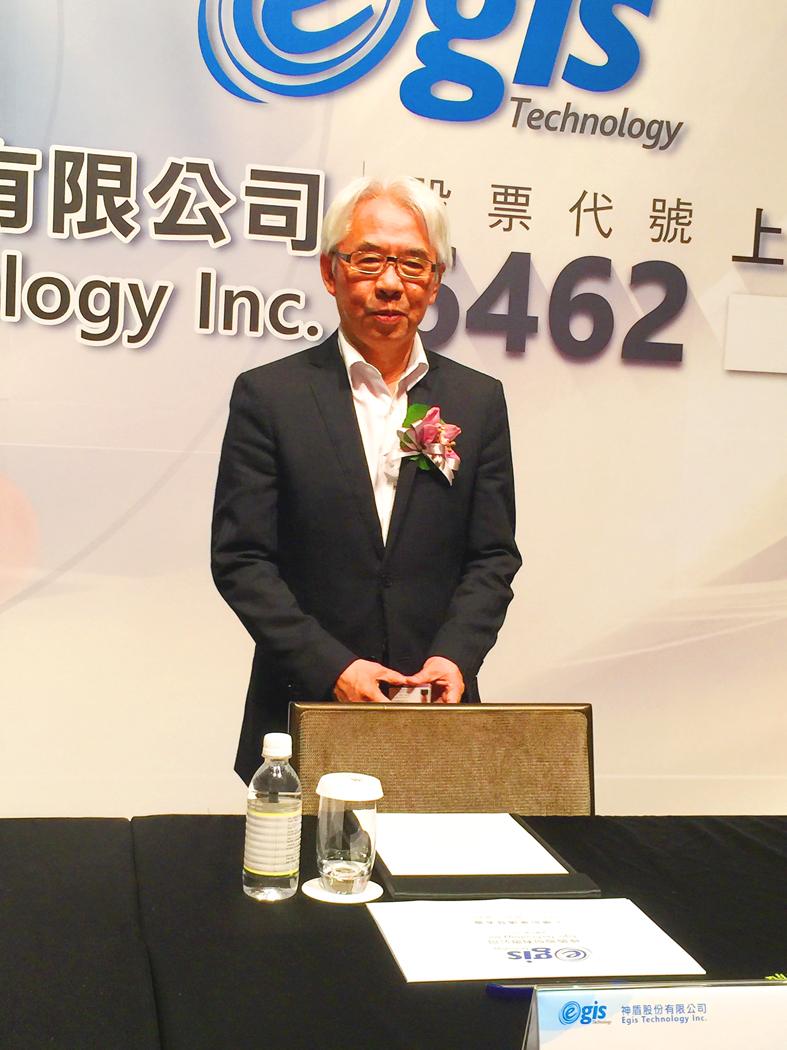Fingerprint sensor supplier Egis Technology Inc (神盾) expects revenue this quarter to continue declining quarter-on-quarter, as stagnant smartphone sales are still curbing demand for chips, a company executive said yesterday.
Wafer supply constraints also remain an issue and could continue to weigh on the company’s business this year, Egis said.
The company said that it was unable to fulfill some rush orders due to a widespread shortage of key components in the second half of last year.

Photo: Vanessa Cho, Taipei Times
Egis sources 8-inch wafers from Taiwan Semiconductor Manufacturing Co (TSMC, 台積電) and Samsung Electronics Co.
The company said that it is evaluating the possibility of adding a third supplier.
Egis would also begin sourcing 12-inch wafers this year, but it will take time for customers to adopt the new chips, it said.
“The [COVID-19] pandemic has significantly affected the company,” Egis chief financial officer George Chang (張家麒) told a videoconference. “We still cannot scale up revenue in the first quarter. It is likely to decline annually.”
On the demand side, order visibility is vague due to supply chain chaos, Chang said.
Short supply of components used in smartphones such as power management ICs could also defer shipments, he said.
Egis, which counts Samsung as one of its major clients, saw revenue drop 40 percent year-on-year to NT$1.19 billion (US$42.05 million) last quarter, the lowest in two-and-a-half years.
Total revenue last year shrank 15 percent to NT$6.22 billion, missing the company’s guidance of double-digit percentage growth as the pandemic dented smartphone demand.
The company reported its weakest quarterly net profit in two years last quarter at NT$4.4 million. Net profit nosedived from NT$203.07 million a year earlier.
Gross margin fell to 38 percent last quarter from 46 percent a year earlier, as Egis shipped more capacitive fingerprint sensors than optical fingerprint sensors, which have a higher margin.
Total net profit last year contracted 26.68 percent to NT$632.56 million, compared with NT$862.68 million a year earlier. Earnings per share tumbled to NT$9.1 from NT$12.6 in 2019.
To regain revenue growth, Egis is expanding its product portfolio to supply versatile chips used in smartphones, including lower-priced chips, Chang said.
The company is developing new chips, including 3D time-of-flight (TOF) sensors, which are used for facial recognition in smartphones, Egis chairman Steve Ro (羅森洲) said on Thursday last week.
Egis hopes to capture early business opportunities from Android smartphone makers, who are likely to follow Apple Inc in using TOF technology. Apple’s iPhone 12 Max is equipped with a TOF sensor.
Egis is also developing new chips used in “true wireless” earphones, Lo said.

Macronix International Co (旺宏), the world’s biggest NOR flash memory supplier, yesterday said it would spend NT$22 billion (US$699.1 million) on capacity expansion this year to increase its production of mid-to-low-density memory chips as the world’s major memorychip suppliers are phasing out the market. The company said its planned capital expenditures are about 11 times higher than the NT$1.8 billion it spent on new facilities and equipment last year. A majority of this year’s outlay would be allocated to step up capacity of multi-level cell (MLC) NAND flash memory chips, which are used in embedded multimedia cards (eMMC), a managed

CULPRITS: Factors that affected the slip included falling global crude oil prices, wait-and-see consumer attitudes due to US tariffs and a different Lunar New Year holiday schedule Taiwan’s retail sales ended a nine-year growth streak last year, slipping 0.2 percent from a year earlier as uncertainty over US tariff policies affected demand for durable goods, data released on Friday by the Ministry of Economic Affairs showed. Last year’s retail sales totaled NT$4.84 trillion (US$153.27 billion), down about NT$9.5 billion, or 0.2 percent, from 2024. Despite the decline, the figure was still the second-highest annual sales total on record. Ministry statistics department deputy head Chen Yu-fang (陳玉芳) said sales of cars, motorcycles and related products, which accounted for 17.4 percent of total retail rales last year, fell NT$68.1 billion, or

In the wake of strong global demand for AI applications, Taiwan’s export-oriented economy accelerated with the composite index of economic indicators flashing the first “red” light in December for one year, indicating the economy is in booming mode, the National Development Council (NDC) said yesterday. Moreover, the index of leading indicators, which gauges the potential state of the economy over the next six months, also moved higher in December amid growing optimism over the outlook, the NDC said. In December, the index of economic indicators rose one point from a month earlier to 38, at the lower end of the “red” light.

MediaTek Inc (聯發科) shares yesterday notched their best two-day rally on record, as investors flock to the Taiwanese chip designer on excitement over its tie-up with Google. The Taipei-listed stock jumped 8.59 percent, capping a two-session surge of 19 percent and closing at a fresh all-time high of NT$1,770. That extended a two-month rally on growing awareness of MediaTek’s work on Google’s tensor processing units (TPUs), which are chips used in artificial intelligence (AI) applications. It also highlights how fund managers faced with single-stock limits on their holding of market titan Taiwan Semiconductor Manufacturing Co (TSMC, 台積電) are diversifying into other AI-related firms.